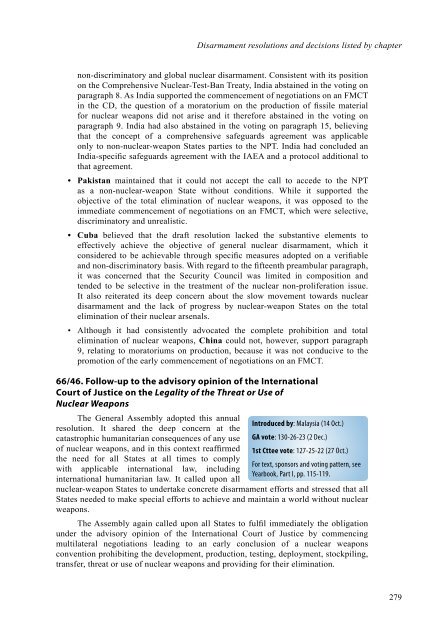DYB2011-Part-II-web
DYB2011-Part-II-web
DYB2011-Part-II-web
Create successful ePaper yourself
Turn your PDF publications into a flip-book with our unique Google optimized e-Paper software.
Disarmament resolutions and decisions listed by chapter<br />
non-discriminatory and global nuclear disarmament. Consistent with its position<br />
on the Comprehensive Nuclear-Test-Ban Treaty, India abstained in the voting on<br />
paragraph 8. As India supported the commencement of negotiations on an FMCT<br />
in the CD, the question of a moratorium on the production of fissile material<br />
for nuclear weapons did not arise and it therefore abstained in the voting on<br />
paragraph 9. India had also abstained in the voting on paragraph 15, believing<br />
that the concept of a comprehensive safeguards agreement was applicable<br />
only to non-nuclear-weapon States parties to the NPT. India had concluded an<br />
India-specific safeguards agreement with the IAEA and a protocol additional to<br />
that agreement.<br />
• Pakistan maintained that it could not accept the call to accede to the NPT<br />
as a non-nuclear-weapon State without conditions. While it supported the<br />
objective of the total elimination of nuclear weapons, it was opposed to the<br />
immediate commencement of negotiations on an FMCT, which were selective,<br />
discriminatory and unrealistic.<br />
• Cuba believed that the draft resolution lacked the substantive elements to<br />
effectively achieve the objective of general nuclear disarmament, which it<br />
considered to be achievable through specific measures adopted on a verifiable<br />
and non-discriminatory basis. With regard to the fifteenth preambular paragraph,<br />
it was concerned that the Security Council was limited in composition and<br />
tended to be selective in the treatment of the nuclear non-proliferation issue.<br />
It also reiterated its deep concern about the slow movement towards nuclear<br />
disarmament and the lack of progress by nuclear-weapon States on the total<br />
elimination of their nuclear arsenals.<br />
• Although it had consistently advocated the complete prohibition and total<br />
elimination of nuclear weapons, China could not, however, support paragraph<br />
9, relating to moratoriums on production, because it was not conducive to the<br />
promotion of the early commencement of negotiations on an FMCT.<br />
66/46. Follow-up to the advisory opinion of the International<br />
Court of Justice on the Legality of the Threat or Use of<br />
Nuclear Weapons<br />
The General Assembly adopted this annual<br />
resolution. It shared the deep concern at the<br />
catastrophic humanitarian consequences of any use<br />
of nuclear weapons, and in this context reaffirmed<br />
the need for all States at all times to comply<br />
with applicable international law, including<br />
international humanitarian law. It called upon all<br />
Introduced by: Malaysia (14 Oct.)<br />
GA vote: 130-26-23 (2 Dec.)<br />
1st Cttee vote: 127-25-22 (27 Oct.)<br />
For text, sponsors and voting pattern, see<br />
Yearbook, <strong>Part</strong> I, pp. 115-119.<br />
nuclear-weapon States to undertake concrete disarmament efforts and stressed that all<br />
States needed to make special efforts to achieve and maintain a world without nuclear<br />
weapons.<br />
The Assembly again called upon all States to fulfil immediately the obligation<br />
under the advisory opinion of the International Court of Justice by commencing<br />
multilateral negotiations leading to an early conclusion of a nuclear weapons<br />
convention prohibiting the development, production, testing, deployment, stockpiling,<br />
transfer, threat or use of nuclear weapons and providing for their elimination.<br />
279


